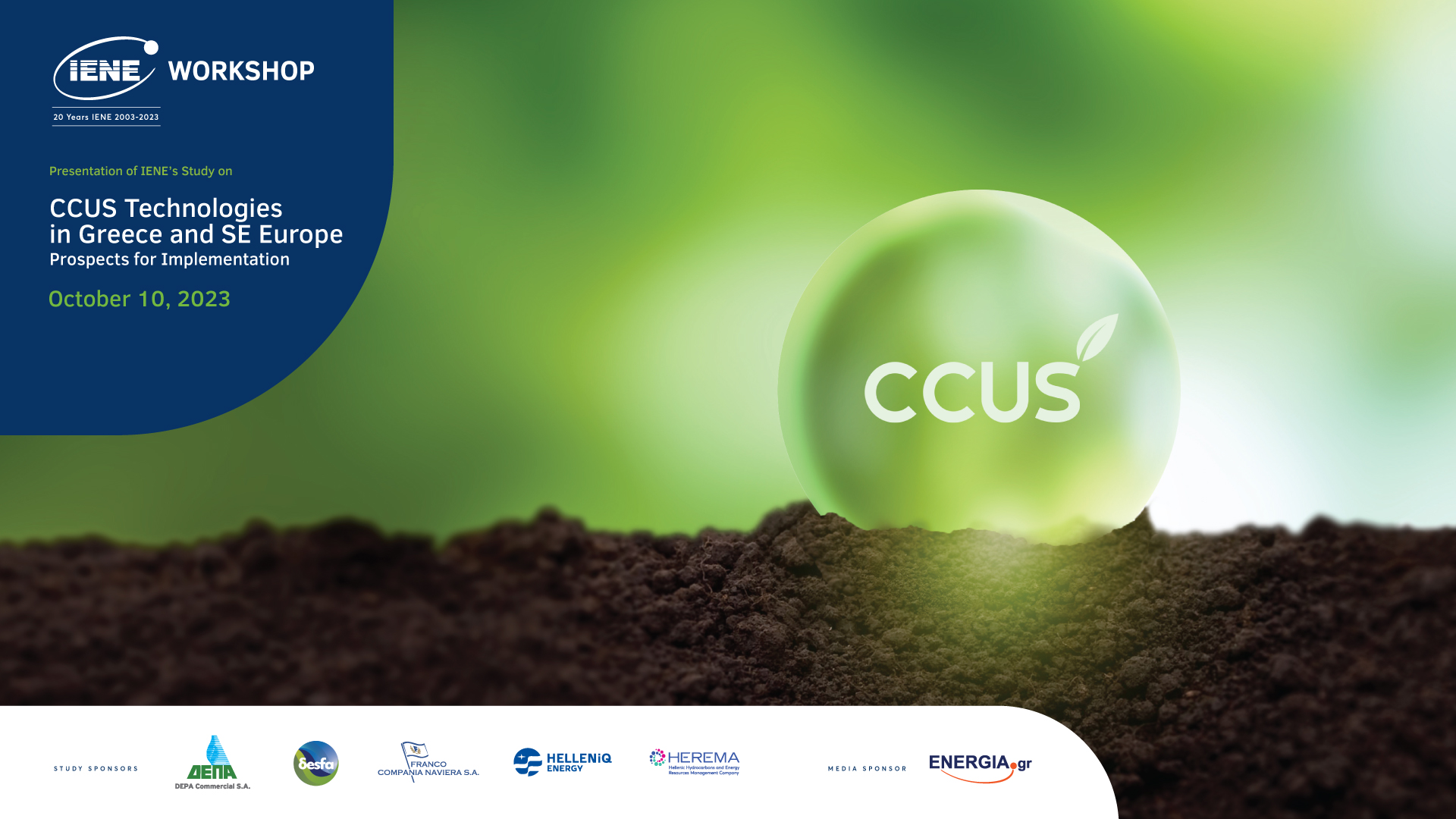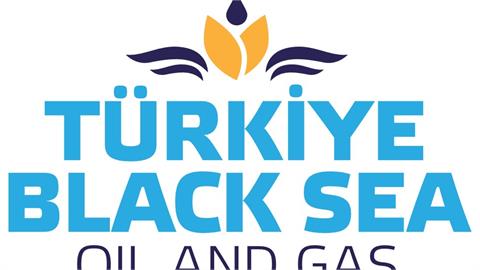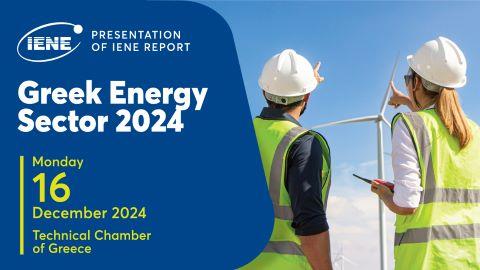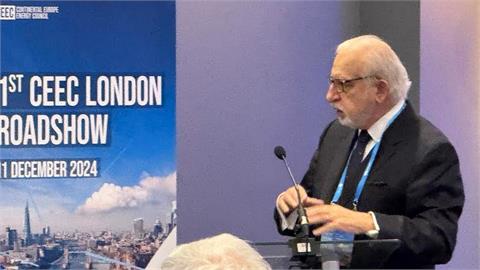On the occasion of completing a pioneering study concerning the prospects for carbon capture, storage, and utilization technologies (CCUS) in Greece and Southeast Europe, IENE organized a special workshop on Tuesday, October 10th, at the National Research Foundation.
On the occasion of completing a pioneering study concerning the prospects for carbon capture, storage, and utilization technologies (CCUS) in Greece and Southeast Europe, IENE organized a special workshop on Tuesday, October 10th, at the National Research Foundation. The workshop featured speakers from the IEA and DG Energy of the European Commission, as well as senior officials from major energy industrial and shipping companies in Greece including the authors of the study titled 'Prospects for the Implementation of CCUS Technologies in Greece'.
The event aimed to achieve two primary objectives: firstly, to present IENE’s study to an invited audience, and secondly, to foster a broader discussion within Greece’s energy and industry companies on the development prospects of CCUS technologies in Greece and the broader Southeast European region.
Carbon capture, utilization, and storage (CCUS) comprise a diverse range of technologies that play a pivotal role in achieving worldwide and European climate change mitigation and energy transition goals. According to the IEA, there are currently around 35 commercial facilities globally employing CCUS for industrial processes, fuel conversion, and electricity generation. The momentum behind CCUS has seen significant growth in recent years, with roughly 300 projects at various stages of development across the entire CCUS technology spectrum. Additionally, over 200 new facilities have been announced, and they are anticipated to become operational by 2030, collectively capturing and storing more than 220 million tons of CO2 annually.
However, as emphasized in the IENE study, turning this momentum into concrete results requires a well thought-out plan and strategic direction, the support of relevant authorities and the creation of an appropriate legal and regulatory framework. In addition, the introduction of essential economic incentives coupled with appropriate financial tools is required.
In light of this situation and the growing emphasis on CO2 reuse, the Institute of Energy for Southeast Europe (IENE) seized the opportunity to conduct an extensive study on CCUS and its potential applications in Greece. This study encompasses various aspects and offers a practical roadmap for developing the necessary infrastructure in the form of clusters across different regions of the country.
This latest study conducted by the Institute of Energy for Southeast Europe, underscores the significant role of CCUS technologies, particularly in conjunction with hydrogen production. The study, was carried on a multi-client basis and was funded by some major energy firms, including DEPA Commercial, HELLENiQ ENERGY, The Independent Gas Transmission Operator (DESFA), the Hellenic Hydrocarbons and Energy Resources Management Company (HEREMA), and the shipping company Franco.

The first session of the workshop commenced with introductory remarks by the Chairman of IENE, Mr. Costis Stambolis, who explained the background of the study, the multi-client approach adopted by the Institute and the interaction with the partner companies, but also hinted on the outlook for CCUS project in Greece.
This was followed by a detailed presentation of the study by the researchers who participated in its preparation, and in particular by Dr. Nikolaos Koukouzas (Director of Research, National Center for Research and Technological Development - EKETA), Dr. Yiannis Basias (Energy Analyst, former President and CEO of Hellenic Hydrocarbons Management Company - EDEY) and Dr. Eugenia Tzannini (lawyer, E. Tzannini and Associates, IENE Partner).

The speakers of the second session, which was moderated by IENE’s Deputy Chairman, Mr. Christos Dimas, discussed the findings of the IENE study. Executives from the partners companies participated in this session. More specifically, Mr. Georgios Polychroniou (Coordinating Director of Strategy & Development Activities, DEPA Commercial), Dr. Aristophanes Stefatos (CEO, Hellenic Hydrocarbons and Energy Resources Management Company - EDEYEP) and Ioannis Stavrakopoulos (Energy Transition and Strategic Planning Specialist, DESFA) commented on the IENE study.

The third session, which was also moderated by Mr. Christos Dimas, covered the international experience of CCUS applications, with the participation of senior company executives and leading experts from international organizations, Mr. Vlassopoulos (CEO, HELLENiQ UPSTREAM S.A., HELLENiQ ENERGY Group), covered the industrial angle of global CCUS applications , while Stavroula Evangelopoulou (Analyst for Hydrogen Technologies and the International Energy Agency - IEA) and Krzysztof (Chris) Bolesta (CCUS Policy Lead, DG ENERGY, European Commission, EU, Brussels) discussed the international experience, EU’s strategy and current CCUS and hydrogen programmes.
The fourth session featured discussions on the potential of CCUS in Greece and current projects. This session was moderated by Dr. Nikolaos Koukouzas principal author of the IENE study and offered insights into various aspects of the CCUS as applied in Greece. The speakers included Dr. Katerina Sardi (CEO and Country Manager, Energean, Greece), Dr. Panos Deligiannis (Head of Shipping, ECOLOG), Mr. Aris Tsikouras, (Director of Strategy for Decarbonization, TITAN Group), Mr. George Daskalakis (Strategy, Corporate Development, Motor Oil Group), and Ms. Cleopatra Avraam (Strategic Planning Senior Manager at DESFA).

The event was wrapped up by Dr. Nikolaos Koukouzas, who summarized the workshop's conclusions and thanked all contributors and supporting companies.
The presentations, speakers bios, a comprehensive study summary and additional details about IENE’s Workshop can be accessed on the dedicated microsite.




